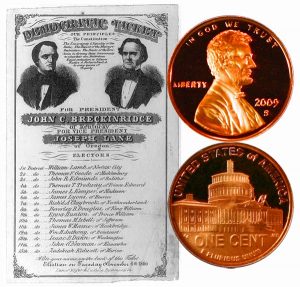Today, the Lincoln Presidency Cent remembers the count of the electoral college on February 13, 1861 when the winners of the presidential and vice-presidential race were announced.
Being the sitting vice-president, John Breckinridge presided over the voting process and announced the winner even though he was a candidate.
From the Congressional Series of United States Public Documents, published in 1877:
=====
February 13, 1861.
The House of Representatives having notified the Senate that the House was ready to receive the Senate in its chamber for the purpose of proceeding to open and count the votes of the electors of the several States for President and Vice-President of the United States, the Senate proceeded to the chamber of the House of Representatives; and
The two houses of Congress being there assembled, the certificates of the electors of the several States for President and Vice-President of the United States were, in their presence, opened by the Vice-President and delivered to the tellers, who, having read and ascertained the number of votes, presented to the Vice-President a list thereof.
The whole number of the electors appointed to vote for President and Vice-President of the United States is 303, of which a majority is 152.
The state of the vote for President of the United States, as delivered by the tellers, is:
For Abraham Lincoln, of Illinois 180;
For John C. Breckinridge, of Kentucky 72;
For John Bell, of Tennessee 39;
For Stephen A. Douglas 12.
The state of the vote for Vice-President of the United States, as delivered by the tellers, is:
For Hannibal Hamlin, of Maine 180;
For Joseph Lane, of Oregon 72;
For Edward Everett, of Massachusetts 39;
For Herschel V. Johnson, of Georgia 12.
Whereupon, The Vice-President declared that Abraham Lincoln, of Illinois, having received a majority of the whole number of electoral votes, is duly elected President of the United States for four years, commencing on the 4th day of March, 1861.
And that Hannibal Hamlin, of Maine, having received a majority of the whole number of electoral votes, is duly elected Vice-President of the United States for four years, commencing on the 4th day of March, 1861.
The Vice-President then announced that the business for which the two houses had assembled was finished; and
The Senate returned to its chamber.
Mr. Trumbull, from the joint committee, reported the following resolution; which was considered and agreed to:
Resolved, That a committee of one member of the Senate be appointed by that body, to join a committee of two members of the House of Representatives, to be appointed by that house, to wait on Abraham Lincoln, of Illinois, and to notify him that he has been duly elected President of the United States for four years, commencing with the 4th day of March, 1861; and also to notify Hannibal Hamlin, of the State of Maine, that he has been duly elected Vice-President of the United States for four years, commencing with the 4th day of March, 1861.
The Vice-President appointed Mr. Trumbull the committee on the part of the Senate.
The House of Representatives passed a similar resolution to the foregoing, and appointed Mr. Elihu B. Washburne and Mr. Burlingame the committee on its part.
=====
A Compilation of the Messages and Papers of the Presidents, by James Daniel Richardson, published in 1917, provided additional insights into the election of the nineteenth president:
=====
Nomination and Election.—Lincoln was first elected by the Republican party Nov. 6, 1860. The Republican National Convention met at Chicago, May 16, 1860, an on the third ballot nominated Lincoln over Seward, Cameron, and Chase.
Platform.–The platform condemned disunion; insisted on States Rights; denounced the Democratic administration; censured the reckless extravagance of the Democratic Government; proclaimed the dogma that the Constitution carries slavery into any or all of the territories to be a dangerous heresy; asserted that the Constitution does not countenance slavery nor should Congress give a legal existence to it; insisted upon the admission of Kansas to statehood; recommended tariff for revenue, with encouragement of the industries; protested against selling public lands already occupied by settlers; opposed any change in the naturalization laws; declared river and harbor appropriations to be both desirable and constitutional ; and demanded a transcontinental railroad.
Opposition.—The Democratic National Convention met, for the first time in the far South, at Charleston, S. C. After many days of fruitless balloting, the convention divided into two sections. Eventually, the Northern half nominated Douglas and the Southern half declared for Breckinridge. The Constitutional Union Party met in national convention at Baltimore, May 19, 1860, and nominated John Bell, on a platform the basis of which was the recognition of no other political principles than the Constitution, Union, and the enforcement of laws.
Vote.—The popular vote as cast by thirty-three States gave Lincoln, 1,865,913; Breckinridge, 848,404; Douglas, 1,374,664. and Bell, 591,900. The electoral vote, counted Feb. 13, 1861, gave Lincoln, 180; Breckinridge, 72; Bell, 39, and Douglas, 12.
=====
The Lincoln Presidency Cent shows with an image of the democratic ticket for the competition, John C. Breckinridge.
